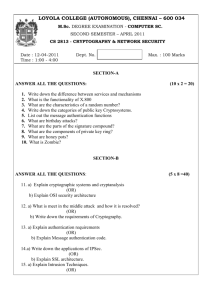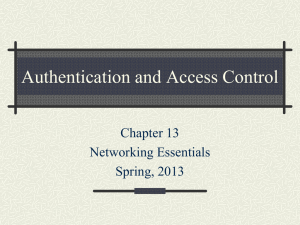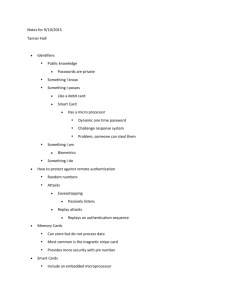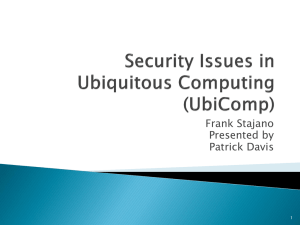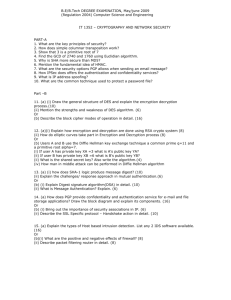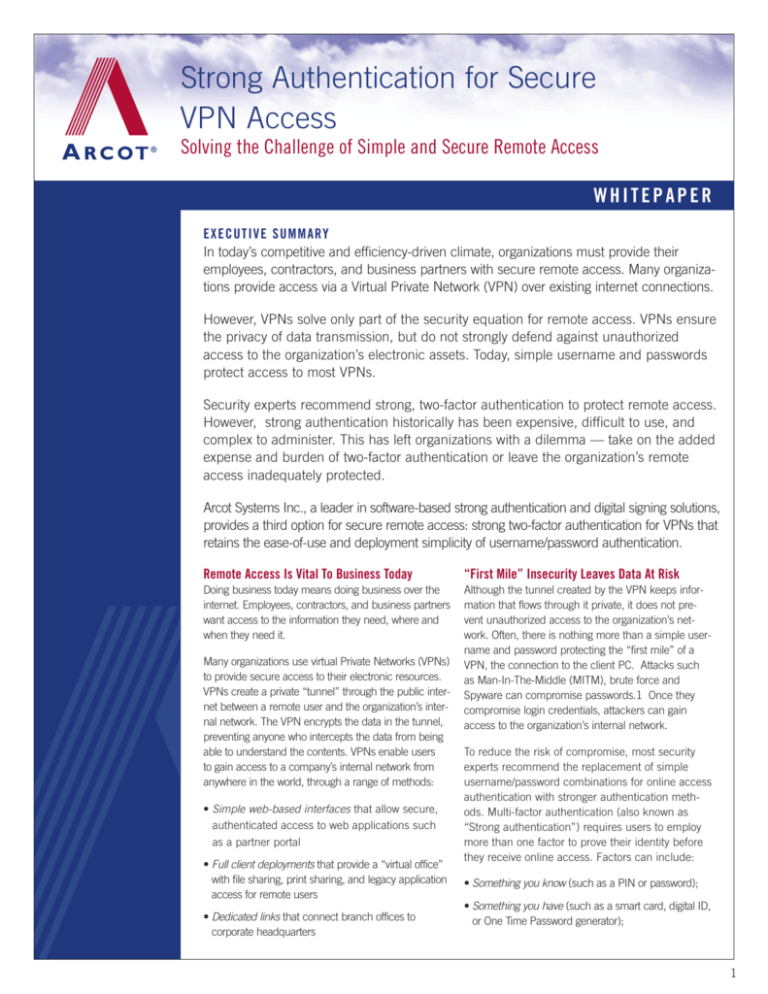
Strong Authentication for Secure
VPN Access
Solving the Challenge of Simple and Secure Remote Access
WHITEPAPER
EXECUTIVE SUMMARY
In today’s competitive and efficiency-driven climate, organizations must provide their
employees, contractors, and business partners with secure remote access. Many organizations provide access via a Virtual Private Network (VPN) over existing internet connections.
However, VPNs solve only part of the security equation for remote access. VPNs ensure
the privacy of data transmission, but do not strongly defend against unauthorized
access to the organization’s electronic assets. Today, simple username and passwords
protect access to most VPNs.
Security experts recommend strong, two-factor authentication to protect remote access.
However, strong authentication historically has been expensive, difficult to use, and
complex to administer. This has left organizations with a dilemma — take on the added
expense and burden of two-factor authentication or leave the organization’s remote
access inadequately protected.
Arcot Systems Inc., a leader in software-based strong authentication and digital signing solutions,
provides a third option for secure remote access: strong two-factor authentication for VPNs that
retains the ease-of-use and deployment simplicity of username/password authentication.
Remote Access Is Vital To Business Today
“First Mile” Insecurity Leaves Data At Risk
Doing business today means doing business over the
internet. Employees, contractors, and business partners
want access to the information they need, where and
when they need it.
Although the tunnel created by the VPN keeps information that flows through it private, it does not prevent unauthorized access to the organization’s network. Often, there is nothing more than a simple username and password protecting the “first mile” of a
VPN, the connection to the client PC. Attacks such
as Man-In-The-Middle (MITM), brute force and
Spyware can compromise passwords.1 Once they
compromise login credentials, attackers can gain
access to the organization’s internal network.
Many organizations use virtual Private Networks (VPNs)
to provide secure access to their electronic resources.
VPNs create a private “tunnel” through the public internet between a remote user and the organization’s internal network. The VPN encrypts the data in the tunnel,
preventing anyone who intercepts the data from being
able to understand the contents. VPNs enable users
to gain access to a company’s internal network from
anywhere in the world, through a range of methods:
• Simple web-based interfaces that allow secure,
authenticated access to web applications such
as a partner portal
• Full client deployments that provide a “virtual office”
with file sharing, print sharing, and legacy application
access for remote users
• Dedicated links that connect branch offices to
corporate headquarters
To reduce the risk of compromise, most security
experts recommend the replacement of simple
username/password combinations for online access
authentication with stronger authentication methods. Multi-factor authentication (also known as
“Strong authentication”) requires users to employ
more than one factor to prove their identity before
they receive online access. Factors can include:
• Something you know (such as a PIN or password);
• Something you have (such as a smart card, digital ID,
or One Time Password generator);
1
Strong Authentication for Secure VPN Access Whitepaper
• Something you are (a biometric factor such as fingerprint
or voiceprint).
Traditional Two-Factor Security Is Costly And Complex
Moving to strong authentication can be both costly and
complex. Deploying a strong second factor, (e.g., “something you have”), typically involves security hardware
such as USB tokens, smart cards, or one-time password
(OTP) tokens. These hardware solutions can be costprohibitive for an organization due to the following reasons:
• Direct and indirect costs to manage and distribute security
hardware
• Periodic replacement of OTP tokens due to battery failure
• IT configuration changes to install drivers on PC desktops
with locked, standardized configurations
• Replacing and distributing lost or broken security hardware
In addition to the costs described above, traditional twofactor solutions introduce additional complexity to both
the user and the IT infrastructure, especially when provisioning security hardware for business partners. This
complexity consists of two major issues:
• Users managing multiple security tokens with different user
interfaces. Studies have shown that users will attempt to subvert any security deployments they believe impedes their productivity. This can translate into actions as simple as placing
passwords on sticky notes or as serious as sharing tokens.
• Business partners juggling multiple tokens from multiple
partners. Organizations must successfully deploy and
support a VPN client plus an authentication solution to
a business partner who may already be struggling with
conflicting login processes from other organizations.
Another challenge to successful deployment of two-factor
authentication for VPNs is that a strong authentication
solution must meet the security needs of a full spectrum
of applications. The applications range from those requiring very high levels of security, such as financial data,
customer information, and product development plans,
to others that may need less security, such as an internal
news portal or other information site.
IT organizations faced with this dilemma must choose
between the painful and risky options of leaving assets
insufficiently protected or beginning a complex, expensive, multiyear project to provide multiple levels of
authentication for the organization.
Arcot® Two-Factor Simplicity And Security
Arcot has the solution to address these challenges: the
ArcotID®, a 100% software, strong authentication “software
smart card.” This solution has the same functionality and
interoperability as a hardware smart card, yet is significantly
easier and less expensive to deploy, manage, and use.
Arcot provides strong, two-factor security in the ArcotID
through its patented Cryptographic Camouflage™ technology.
ARCOT SECURES VPN AUTHENTICATION FOR ALL TYPES OF USERS
fire
wa
ll
Traveling Users
firewall
Business Partners
The Internet
VPN Server
Corporate Electronic
Resources
Arcot
WebFort
Remote Employees
Arcot
RiskFort
Remote/Branch
Office
A “Man-in-the-Middle” attack occurs when an attacker inserts himself in the middle of a session between a client and server, such
as a remote user and a web portal. Masquerading as both the legitimate client and server, the attacker intercepts all communications
including log-on credentials and one-time-password tokens. A “brute force” attack occurs when an attacker exhaustively attempts every
possible password to break into a system. This type of attack is more feasible as computing hardware becomes cheaper and faster.
2
Strong Authentication for Secure VPN Access Whitepaper
THE BUSINESS PARTNER’S DILEMMA – MANAGING MULTIPLE IDS AND TOKENS
Partner Security Partner
Administration Resource
Partner Security Partner
Administration Resource
Partner Security Partner
Administration Resource
•••••••
•••••••
•••••••
•••••••
•••••••
•••••••
Business Partner
The ArcotID is not vulnerable to MITM attacks or brute force
attacks that attackers can mount against other software
tokens and credential containers.
The ArcotID adds security without adding complexity.
Organizations can configure the user experience to look
identical to existing username/password authentication.
The underlying patented Arcot technology delivers strong
authentication for secure access invisibly and reliably.
The ArcotID is easy to integrate with existing authentication
solutions. It supports applications enabled for hardware
smart cards or USB security tokens without any application
changes. It also supports applications that enable OTPs
without modification using the included RADIUS interface. In short, ArcotID allows organizations to exercise
control over electronic access with no requirement for
new hardware, readers, or drivers.
Arcot’s software-based approach eliminates the burden
of deploying and supporting hardware tokens. With its
simple user interface, the ArcotID keeps support and
training costs low and user adoption rates high.
FEATURE COMPARISON OF STRONG AUTHENTICATION SOLUTIONS
USERNAME/
PASSWORD
Multi-factor authentication (strong)
OTP HARDWARE
SMARTCARD
3
3
O/S KEY STORAGE
ARCOTID
3
Digital signature capable
3
3
3
File encryption capable
3
3
3
Man-in-middle attack resistant
3
3
3
Familiar user interface
3
3
3
Brute-force resistant
Client-less software option
3
Unlimited life (no battery)
3
3
3
3
3
3
3
3
3
Strong Authentication for Secure VPN Access Whitepaper
high
ArcotID DELIVERS THE STRENGTH OF HARDWARE WITH THE EASE OF SOFTWARE
ArcotID
SECURITY
Hardware
User Name
& Password
low
•••••••
•••••••
low
EASE OF USE
Organizations can deploy the ArcotID more quickly than
hardware smart cards and OTP tokens. Arcot’s fully selfservice web provisioning system can provision ArcotID
software smart cards to employees and partners with zero
administrator assistance. Existing desktops do not need
additional software nor do they need any new hardware
to deploy an ArcotID.
These features enable substantial cost savings for
the organization:
• Online self-enrollment
• Lost credential recovery
• Fast temporary credentials issuance
• Location-dependent access controls
• No end-user software install
• Support for roaming access
Take Control Over The Authentication Lifecycle
Arcot VPN authentication solutions are part of Arcot’s
family of authentication products that address the needs
of the entire authentication lifecycle, from issuing
credentials, to risk management and revocation.
Arcot RegFort™ enables organizations to choose from a
range of options for distributing authentication credentials.
They can allow full self-service or IT-directed operation
with multiple registration capabilities for additional
control. RegFort also supports loading digital IDs into
ArcotIDs or hardware smart cards to provide additional
flexibility for IPSec-based VPNs, client SSL certificates
and other digital ID-enabled applications.
Arcot WebFort® is a high performance authentication
server that supports both password and strong two-factor
high
A simple, consistent user experience
Arcot delivers a comprehensive, strong authentication solution for all the major enterprise VPN
technologies including SSL, Hybrid or Tunneling
SSL and IPSec-based VPNs. Arcot’s patented
Cryptographic Camouflage™ technology protects all
remote users. Regardless of the VPN technology
used, authentication using an ArcotID is a simple
and intuitive process. A user with an ArcotID initiates a connection to the organization’s VPN and
performs one of two familiar tasks when prompted:
1. Enter a username
2. Enter a PIN/password
Ease of use and a consistent login experience
are critical to the success of a secure authentication deployment. ArcotID provides both.
authentication using the ArcotID to provide a fully softwarebased strong authentication solution. WebFort even supports
a mixture of strong authentication and username/password
infrastructures mode deployments.
To enhance the authentication process further, Arcot
RiskFort™ offers sophisticated real-time risk management.
RiskFort derives a risk score by evaluating aspects of
each online transaction. It examines data points such
as the originating device, the geographic location of the
user and the nature of the authentication event, and then
correlates these aspects with user behaviors. RiskFort
uses this to detect and block potential malicious activity
automatically before it can do any damage.
4
Strong Authentication for Secure VPN Access Whitepaper
RELATIVE COSTS OF STRONG AUTHENTICATION SOLUTIONS
OTP HARDWARE
SMARTCARD
ARCOTID
$$$$
$$$$$
$$
Shipping cost
$$
$$
–
Replacement cost
$$
$$
–
Training cost
$$
$$
$
Direct cost (including reader)
Conclusion
Organizations must provide secure remote access
to their employees, contractors and partners in
order to remain competitive in the marketplace.
VPNs provide a reliable way to secure the data
transmission for remote access, but do not address
the security of the login process itself. This insecurity
leaves the entire network at risk.
In the past, organizations have faced a difficult
choice between deploying complex, expensive,
difficult-to-use but secure authentication technology
and authentication technology that was easy,
inexpensive and insecure.
Fortunately, Arcot has the solution to satisfy the
need for two-way authentication for VPN users: the
ArcotID, a 100% software, strong authentication
“software smart card.” This solution has the same
functionality and interoperability as a hardware
smart card, yet is significantly easier and less
expensive to deploy, manage, and use.
Arcot’s proven, secure authentication solutions scale
to meet the size and complexity of any organization,
extending the reach of organizational extranets to
remote employees and business partners. Arcot
protects over 11 million users while maintaining
the performance and responsiveness demanded
by today’s authentication infrastructures.
About Arcot
Arcot is the cloud authentication
leader. Our fraud prevention,
strong authentication, and
e-Document security solutions
make Web transactions and
online access safe for millions
of consumer, enterprise, and
e-Commerce users.
Organizations can transparently
deploy stronger authentication
and allow users to conveniently
authenticate from any computer
or mobile device. Arcot solutions
deliver the right balance of cost,
convenience and strength.
For more information, please visit www.Arcot.com, email sales@arcot.com, or contact your nearest sales office:
Corporate Headquarters, U.S.
Arcot Systems, Inc.
Ph: +1 408 969 6100
United Kingdom
Arcot International
Ph: +44 118 965 7998
Germany
Arcot Deutschland GmbH
Ph: +49 8157 997793
India
Arcot R&D Software Private Ltd
Ph: +91 80 6660 2745
www.arcot.com
Copyright © 2010 Arcot Systems, Inc. All rights reserved. Arcot, Arcot WebFort and ArcotID are registered trademarks of
Arcot Systems, Inc. All other trademarks are the property of Arcot Systems, Inc. or their respective owners.
10-85
6

